US Still Seeking To Reach Nuclear Deal With Iran: Report
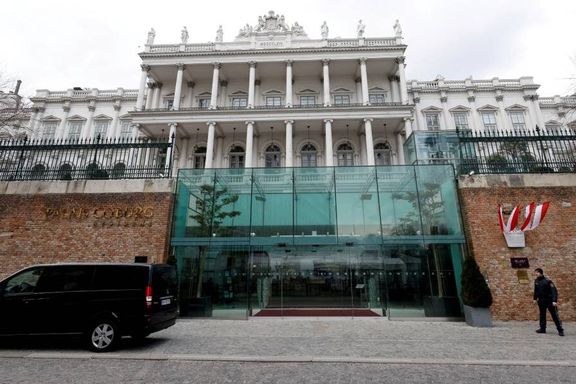
Israeli officials say that the White House is still seeking to reach a nuclear deal with Iran despite the comments by President Joe Biden who said earlier the deal is “dead”.

Israeli officials say that the White House is still seeking to reach a nuclear deal with Iran despite the comments by President Joe Biden who said earlier the deal is “dead”.
Israeli daily Haaretz wrote Tuesday that Israeli officials believe the Biden administration is still aiming to reach a nuclear agreement with the Islamic Republic and has the support of the US defense establishment while the recently emerged footage showing President Biden saying the deal was “dead” has gone viral on social media.
In this video, the US President confirmed that the deal was “dead”, but he said he could not announce it officially for “a lot of reasons”.
Biden did not give a direct answer about the “reasons” why Washington refuses to officially announce this. Israeli officials say this might have been a slip of the tongue by Biden.
Israeli officials quoted by Haaretz claim that Washington knows it will be difficult for the Iranian regime to suppress the recent protests without improving the economic situation and therefore concluding the deal may be in their interest.
These officials who have been in touch with their US counterparts have also given the impression that despite the challenging situation, a significant twist in the nuclear deal was coming within in a few months.
However, an Israeli official told Haaretz that “Israel has no practical capacity to attack Iran effectively without the support and cooperation of the US, and anyone who says otherwise is willfully lying.”
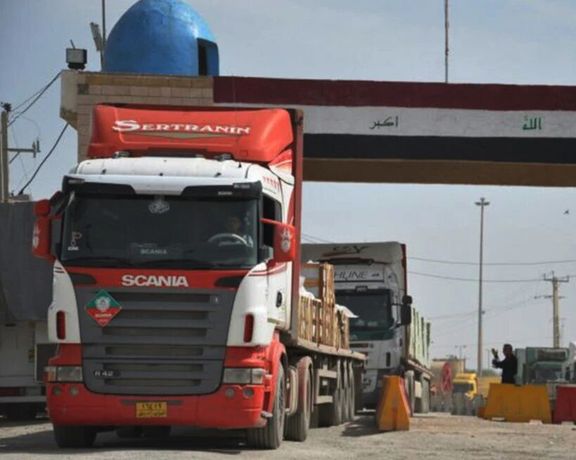
An informed source in Baghdad told Iran International that Washington has received reports on Iraq conducting trade with Iran using US dollars despite US sanctions.
This source added Monday that the names and bank account numbers that have secretly interacted with Iran have not yet been revealed, but the Biden administration has found out that a large amount of US dollars has been transferred from Iraq to some countries, including Iran.
This comes as the rate of US dollar against Iraqi dinar in the markets has risen leading to dissatisfaction of the people and politicians.
Based on the information received by Iran International from Iraqi officials, the government of Iran should buy goods from Iraq using Iraqi dinar in exchange for its gas and electricity exports to its neighbor, at the same time, any trade and commercial interaction with Iran in US dollars is forbidden.
A few weeks ago, Uruk News, a media outlet close to the Iraqi Sadr movement, revealed that “during the visit of the new Iraqi Prime Minister, Mohammad Shia al-Sudani, four billion dollars were given to Iran under an ambiguous contract.”
As Iran International sources have explained, apparently both the Iraqi government and US sources in Iraq do not want this issue to be made public as it will cause complications, and they have put pressure on the Iraqi media not to publish it.
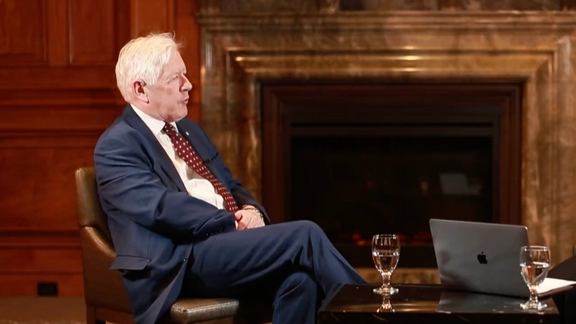
Punitive measures to hold the Islamic Republic accountable for its deadly crackdown on dissent continue with Western sanctions and international investigations.
In an interview released on Saturday, Canada’s envoy to the United Nations Bob Rae told Iran International’s correspondent that organizations focused on accountability have started to gather and verify information about the current wave of antigovernment protests.
He praised efforts by the United Nations “to get to the root of the injustices that are happening to make sure that the investigations are in place; that we are gathering the information and the evidence that will lead to accountability.”
The Canadian diplomat underlined that there should be consequences for the criminal acts, “and many things that are happening in Iran are criminal,” he said, noting that there are “abuses of human rights and abuses of international law.”
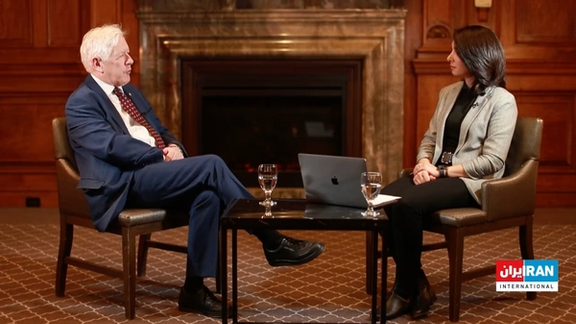
He urged the people of Iran to be patient to see the results of mechanisms deployed to hold the regime accountable, saying there is no tribunal yet because the Islamic Republic is not a party to the International Criminal Court. However, he said that “there will be a reckoning; there will be an accountability process for the regime in Iran.”
"We're not going to invade Iran, but we won't ignore what's happening either. The regime isn't stable or predictable because the ground underneath the feet of the regime is shifting all the time... Dictators think they can control everything, but they can't," he stated, adding that “Canada has always been a place of refuge.”
Earlier in the month, the Islamic Republic was voted out of the United Nations Commission on the Status of Women (CSW) for policies contrary to the rights of women and girls. Members of the UN Economic and Social Council (ECOSOC) adopted a US-drafted resolution to "remove with immediate effect the Islamic Republic of Iran from the Commission…for the remainder of its 2022-2026 term.” The CSW is the principal global intergovernmental body exclusively dedicated to the promotion of gender equality and the empowerment of women.
It was the second step against the Islamic Republic’s violations of human rights during the current wave of protests. The first step by the United Nations was creating a fact-finding mission by the Human Rights Council. The Geneva-based UN Human Rights Council voted on November 24 to launch an independent investigation into the regime’s deadly repression of protests that has killed around 500 civilians, including about 60 children.
The Islamic Republic might become more isolated in the Middle East, as policies of intervening in other countries affairs was condemned at the “Baghdad II” summit, held December 20 in Jordan aimed at resolving regional crises, particularly in Iraq. France and the European Union play a major role in the annual gathering. The first summit was held in Baghdad last year.
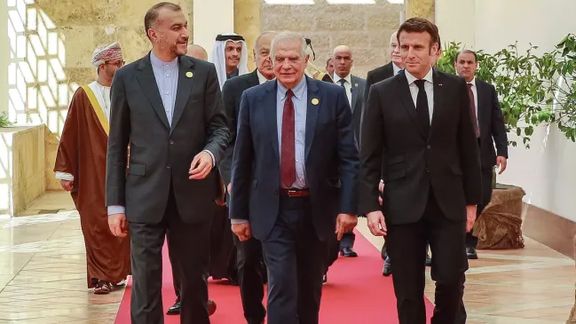
Etemad newspaper in Tehran cited Macron as talking about a regional project, supported by France, to limit Iran’s influence in the region. The daily quoted Macron as saying that he is convinced there is no solution to the problems of Lebanon, Iraq and Syria except through reducing Tehran's regional influence.
During the summit, Iraqi Prime Minister Mohammed Shia al-Sudani said, "We reject interference in its (Iraq) internal affairs, undermining its sovereignty, or attacking its lands.” At the same time, he added, "We do not accept any threat to be launched from Iraq against any of the neighboring countries or the region."
Since the beginning of the uprising in Iran in mid-September, Tehran has accused foreign countries, including regional rival Saudi Arabia – with which it has had no diplomatic relations since 2016 – of fomenting unrest as protests rage on.
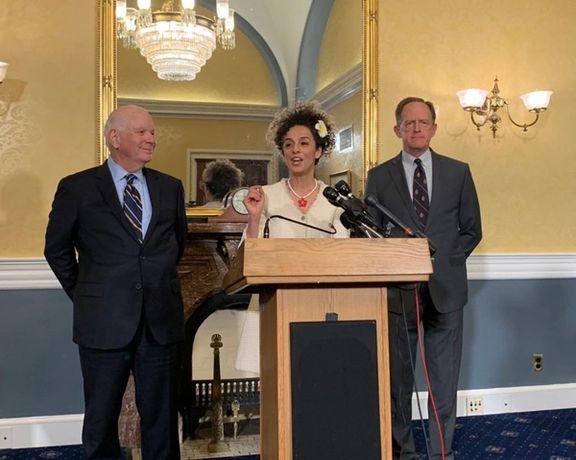
The US Congress has reportedly passed the Masih Alinejad HUNT Act, named after the US-based journalist who was the target of a kidnapping plot by Tehran last year.
“It’s official: Congress has passed the Masih Alinejad HUNT Act, imposing mandatory sanctions on Iranian officials responsible for ongoing suppression of basic human rights in Iran and identifying any foreign banks transacting with those sanctioned individuals,” Twitter account of Senate Banking Committee Republicans said on Saturday.
Its Ranking member is Pennsylvania’s Republican Senator Pat Toomey, who cosponsored the act with Maryland Democrat Senator Ben Cardin. The Masih Alinejad Harassment and Unlawful Targeting Act of 2021 or the Masih Alinejad HUNT Act of 2021 was introduced in the Senate in December 2021 after the New York-based journalist was the target of an Iranian plot to kidnap her and take her to Iran via Venezuela, according to US law enforcement. On July, a man armed with a loaded AK-47 was arrested outside the Brooklyn home of the Iranian dissident and women’s rights activist. A federal complaint said the man named Khalid Mehdiyev, 23, was found with the assault rifle, multiple high-capacity magazines and additional rounds of ammunition and a suitcase full of cash as well as two other different license plates when he was arrested after lurking in the area for two days.
This bill imposes sanctions on foreign persons (i.e., individuals or entities) that are acting on behalf of Iran's government and involved in the harassment of certain individuals, such as human rights activists.
The news about the adoption of the bill was announced on Christmas eve, December 24 when the US Congress is in recess. It is not clear when it was approved, unless if it was part of the omnibus budget bill that was passed right before the holidays.
The bill requires the Department of State to periodically report to Congress on the identities of foreign persons acting on behalf of the Islamic Republic regime that are knowingly responsible for or complicit in the surveillance, harassment, imprisonment, or killing of citizens of Iran or the United States. These can be individuals “who seek to expose corruption or illegal activity by Iranian government officials; obtain, defend, or promote internationally recognized human rights; or obtain, defend, or promote the rights and well-being of women, religious and ethnic minorities, and the LGBTQ community in Iran.”
The report must include foreign persons involved in such actions that occur inside or outside Iran, and then the US president must impose property-blocking sanctions on such person, as well as visa-blocking sanctions on the identified individuals.
The Department of the Treasury must also submit to Congress a report identifying any foreign financial institution that knowingly conducts a significant transaction with a person sanctioned under this bill. The Treasury may prohibit the opening or impose strict conditions on the maintaining of a US correspondent account by such a financial institution.
Dozens of Iranian journalists in other countries, including those working for BBC Persian TV and London-based Iran International TV, repeatedly complain about their own and their family members' harassment in Iran, and say they have been threatened by authorities about possible actions.
Iran executed in December 2020 Rouhollah Zam, editor of a social-media channel, after he was kidnapped in Iraq and convicted on security charges and televised confessions, without due process of law.

Germany has suspended all export credits and investment guarantees for companies doing business with Iran as a measure against government’s harsh treatment of protesters.
The Economy Ministry said in a statement Friday that it was taking the step “in view of the very serious situation in Iran”.
It added that other “economic formats,” including a dialogue on energy issues have been suspended too.
Export credit guarantees protect German firms from losses if the exports are not paid for. Investment guarantees are given to safeguard direct investments by German companies from political risk in target countries.
The ministry further underlined in its statement that Germany Trade and Invest as well as the German business delegation in Iran had “reduced their activities to a minimum”.
The investment guarantees would be suspended immediately, according to the statement, but export credit guarantees will be placed on hold from January, and there would be some exceptions in case of a humanitarian need.
Trade guarantees with the Islamic Republic had been on hold for many decades but following the nuclear deal signed between Iran and the P5+1 group of countries they were lifted in 2016.
The trade volume between Tehran and Berlin was 1.76 billion euros ($1.87 billion) in 2021 and 1.49 billion euros in the first nine months of this year, the ministry said.
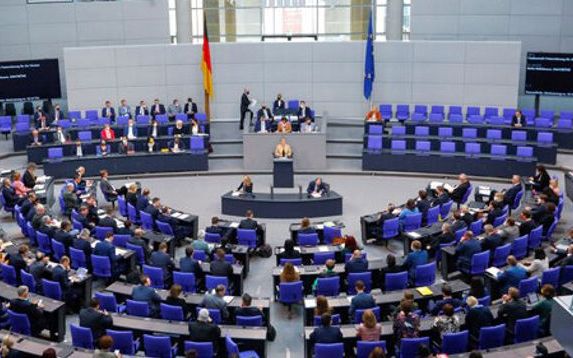
A group of 43 members of the Social Democratic Party in the German Parliament demanded that the Islamic Revolutionary Guard – or IRGC --be designated as a terrorist group.
Some representatives said, "A regime that defends its survival only by assassinating its own people has lost its legitimacy." Considering that other German parties such as Alliance 90/The Greens, and Free Democratic Party also seem to favor such a measure, it is possible that the IRGC will be blacklisted by Berlin and the European Union. The list of countries that have designated the Revolutionary Guard is increasing.
Kaweh Mansoori, a member of the party with Iranian roots, also said, "We are ready to take tougher and more intense steps than the previous sanctions of the European Union against the barbaric clerical regime.”
In November, the German parliament – the Bundestag -- passed a comprehensive package of measures against the Islamic Republic following a session on the current situation in Iran. The ratified motion, submitted by a coalition of factions, called on the German government to support the protest movement in Iran and increase pressure on the regime in Tehran.
The lawmakers also called to further examine whether and how the Islamic Center in Hamburg (IZH) can be closed for good, calling it "the hub of the operations of the Iranian regime in Germany.” Germany has already expelled Iranian cleric Soleiman Mousavifar, who was the deputy head of the IZH, from the country for his support for Shiite extremist and terrorist organizations.
Moreover, on Thursday the Dutch Parliament passed a motion urging the government to support EU's proscription of IRGC as a terrorist organization, considering the repression of protesters and supply of drones to Russia.
The motion was introduced to designate the IRGC as a terrorist group both at the national and European level.
Earlier this month, the EU designated 20 people and Iran’s state media over reported human rights abuses, along with eight people or entities over sending drones to Russia.
The pressure on the IRGC is not limited to putting it on the list of terrorist organizations, as there are other demands about human right issues related Tehran’s crackdown of dissent.
Several members of the German parliament have politically sponsored Iranian political prisoners most of whom are in danger of imminent execution on bogus charges. The number of German MPs taking political sponsorship of Iranian protesters is growing. Political patronage or sponsorship (politische patenshaften in German) is a way for the lawmakers to select a specific political prisoner and use their political weight to campaign for the prisoner’s freedom. This is mainly done by addressing the ambassador and the relevant government and international institutions dealing with human rights.
Also on Tuesday, all 183 members of the Council from four major parties said they will sponsor 183 prisoners including those sentenced to death for their participation in the current wave of antigovernment protests in Iran, ignited by the death in custody of 22-year-old Mahsa Amini.